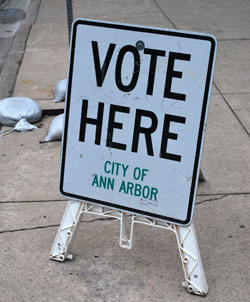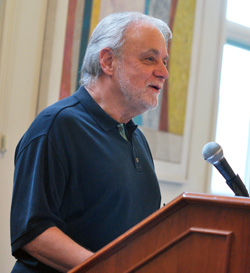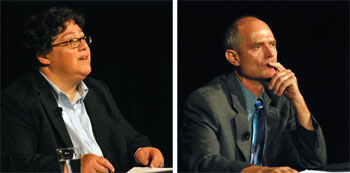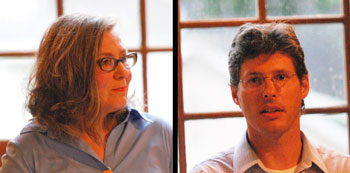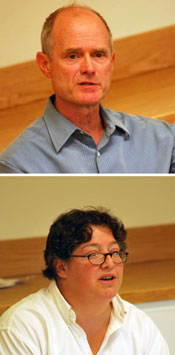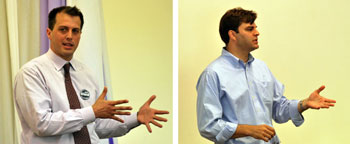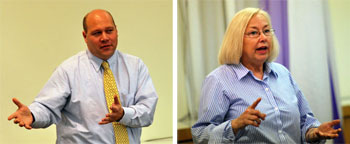On Tuesday evening, the Ward 4 Democratic Party hosted a forum at Dicken Elementary School so that residents could pose questions to primary candidates for one of the ward’s two city council seats. Margie Teall, the incumbent who has held the seat since 2002, and Jack Eaton, who has been active in politics on the neighborhood level, answered questions for a bit more than an hour.
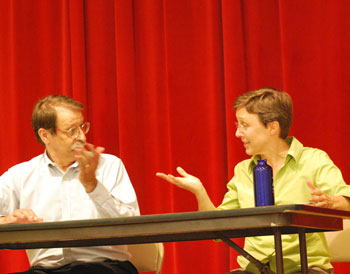
Jack Eaton and Margie Teall, candidates for the Ward 4 city council seat, engage in the subtleties of negotiation over who would deliver their opening remarks first. (Photos by the writer.)
City council representatives are elected for two-year terms and each of the city’s five wards has two seats on the council, one of which is elected each year. Also in attendance at Tuesday’s forum was Marcia Higgins, the Ward 4 council representative who won re-election in November 2009, defeating independent challenger Hatim Elhady.
Besides Higgins, other elected officials and candidates for office who were introduced at the forum included: LuAnne Bullington (candidate for the 11th District county board of commissioners seat), Ned Staebler (candidate for the 53rd District state Representative seat), Leah Gunn (county commissioner representing the 9th District of the county and seeking re-election), Patricia Lesko (candidate for Ann Arbor mayor). All the candidates are Democrats.
Eaton’s main theme was a need to focus more on infrastructure – those things we need, not the things that might be nice to have. Eaton was keen to establish that his candidacy was not meant as a personal attack on Teall, saying that he expected his supporters to focus on the issues and to conduct themselves in a civil way. His opening remarks were heavy on thanks and appreciation for Teall’s long service on council, particularly with regard to the creation of Dicken Woods, which is now a city-owned nature area.
In the course of the forum, a pointed question to Teall on her biggest regret while serving on the council elicited an acknowledgment from her that she regretted her contribution to the problem last year with city councilmembers emailing each other during council meetings. Eaton was quick to give Teall credit for publicly apologizing in a timely way for her role in the scandal.
For her part, Teall focused on setting forth accomplishments while serving on the council. Those ranged from the longer-term budgeting strategies that she said had helped ensure that Ann Arbor was weathering the economic crisis better than other Michigan cities, to the budget amendment she introduced and the council passed in May, which proposed using $2 million from the Downtown Development Authority, plus more optimistic estimates for state revenue sharing, to eliminate the need to lay off some police and firefighters.
The candidates exchanged different views on basic infrastructure issues like the Stadium Boulevard bridges and stormwater management, to single-stream recycling and leaf collection, to Georgetown Mall, and the transparency of government. [Full Story]




